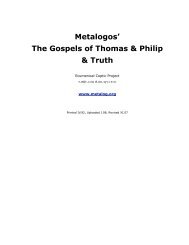Andrew Louth - Syriac Christian Church
Andrew Louth - Syriac Christian Church
Andrew Louth - Syriac Christian Church
You also want an ePaper? Increase the reach of your titles
YUMPU automatically turns print PDFs into web optimized ePapers that Google loves.
49A<br />
C<br />
D<br />
B<br />
TEXTS 193<br />
passions, showing the economy to be pure of any fantasy, and<br />
redeeming the nature from the passions to which it has been<br />
condemned as a result of sin. And again he shows his eager<br />
desire, putting death to death in the flesh, in order that he<br />
might show as a human being that what is natural is saved in<br />
himself, and that he might demonstrate, as God, the Father’s<br />
great and ineffable purpose, 5 fulfilled in the body. For it was<br />
not primarily in order to suffer, but in order to save, that he<br />
became a human being. Therefore he said, Father, if it be<br />
possible, let this cup pass from me; nevertheless, not mine, but<br />
your will be done; 6 showing, in the shrinking, the<br />
determination of the human will shaped and brought to be (in<br />
harmony with the divine will) in accordance with the<br />
interweaving of the natural logos with the mode of the<br />
economy. For the Incarnation is an effective demonstration of<br />
both nature and the economy, I mean of the natural logos of<br />
what has been united, confirming the mode of the hypostatic<br />
union, and ‘instituting afresh the natures’, 7 without any<br />
change or confusion. But the will did not need to be rendered<br />
idle or made active in accordance with the same will: that<br />
would be absurd, since the Son’s will is by nature the same as<br />
the Father’s. The Saviour therefore possesses as a human being<br />
a natural will, which is shaped, but not opposed, by his divine<br />
will. For nothing that is natural can be opposed to God in any<br />
way, not even in inclination, for a personal division would<br />
appear, if it were natural, and the Creator would be to blame,<br />
for having made something that was at odds with itself by<br />
nature.<br />
How did the Word Incarnate truly become a human being, if<br />
it lacked that which best characterizes a nature as rational?<br />
For what is deprived of the movement of longing that follows<br />
desire has no share in any power of life. And that which does<br />
not possess any power of life out of its nature is clearly not a<br />
soul of any kind, without which the flesh is not what it is.<br />
Therefore the economy would be a mere fantasy, if he merely<br />
had the shape of flesh. But if, as Severus said, he did not have,<br />
as man, a natural will, the Word Incarnate would not fulfil the<br />
hypostatic union with flesh, endowed by nature with a<br />
rational soul and intellect. For if he was truly, as man, lacking<br />
a natural will, he would not truly have become perfect man.<br />
And if he did not truly become perfect man, he did not become<br />
man at all. For what kind of existence does an imperfect<br />
nature have, since the principle of its existence no longer<br />
exists?




